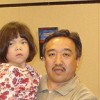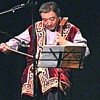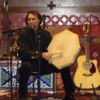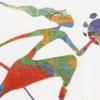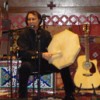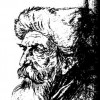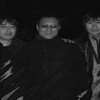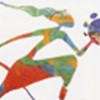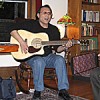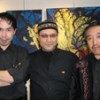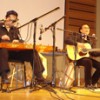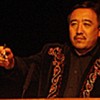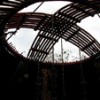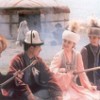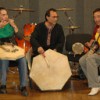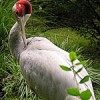Shop
Akku – Swan Song
This kui (or melody) is lovingly rendered by Yerlan Sabitov on the Kazakh kyl kobyz or fiddle. As with every Kazakh kui, its notes tell a story. Yerlan’s version goes like this: There was a famine and the whole village decamped and moved away. They left behind one family – a young man, his mother and his sisters. They were starving. There was a lake close by where swans lived. Swans are sacred among Kazakhs, but the young man decided to violate the taboo against killing them so as to save his family. He went to the lake. A pair of swans saw him and rose up in the air. He pulled back his bow and shot one of them in the heart and it came tumbling to the ground. The swan’s mate was so heartbroken that it also fell to the ground as if shot.
Aldi Bolem – Lullaby
This folk lullaby expressing the gentle glow of childhood is lovingly rendered in an ensemble arrangement that evokes the full beauty of the original text.
Anshynyng Zary – The Hunter’s Lament
This wordless melody or kui tells the story of a young man who accidentally killed his younger brother on a hunting trip. Not knowing how to tell his parents about the tragedy in words, he composed Anshynyng Zary and played it for them. It is said that they immediately understood everything that had happened.
Arnau – A Dedication
Composed to the words of Shal aqyn (1748-1819) – see Til – Arnau is a didactic song, a moral credo characteristic of the Kazakh epic tradition. Shal aqyn originally composed the poem as words of advice to his young khan.
Ashu – Anger
This song sets its emotional stage with traditional steppe flute music, jaw harp, and bird calls. The deep resonant vocals draw from the words of 15th century poet Asan Kaigy, while later chord progressions reveal the largely unknown influence of the Beatles on contemporary Central Asian musical expression.
Ayken-ai – A Love Song to Ayken
Roksonaki specially arranged this mournful lyrical love song in a singer/songwriter tradition for their 2008 Nauryz Tour to 8 US cities. Ayken is the name of the beloved girl. “You came into this world. I came into this world. We came together.” So beautiful!
Bau – Shamanic Chant
Bau is a shortened form of the word “arbau” – the Kazakh term for a shamanic chant. The words of this particular arbau were once used to cure livestock animals bit by a poisonous insect. Ruslan Kara researched this text and consulted with scholars specializing in Kazakh folklore before creating the unique sounds that for him give voice to the chant’s meaning.
Bult Shakyru – Call for Rain
This is shamanic “invitation to the cloud” can be surprisingly effective. During the 2002 Smithsonian Folklife Festival, it brought rain to cool off scorchingly hot days and during the 2008 Nauryz Tour it caused snow and cold showers at times when Roksonaki would have preferred a little spring sunshine. The words have no known author and they are highly metaphorical. We hope to figure out and post a translation soon.
Elegizu – Anxiety
“Where is my sleep, oh god, where is my sleep?
Outside is that sobbing or a guffaw?
That is why the green poplars have remained thus.
That is why I am devoted to just one kind of thought.”
Thus begins this almost frenetically paced song based on the words of Kazakh poet Tumanbay Moldagaliev.
Erteng – Tomorrow
Though all my dreams are shattered today, tomorrow will be mine. The slow melodic pulse of these philosophical reflections builds throughout this song that recalls the mournfulness that permeated some 1980s New Wave music.
Introduction
This wordless mood piece evocative of the Kazakh steppe is replete with ephemeral sadness. It features a deeply emotional, even heart-breaking flute melody, that introduces the listener to the world of memories and reflections. It was composed by Roksonaki’s founder Ruslan Kara. Ruslan created the music for the Kazakh KinoStudio film “Desant – The Landing.”
Jolga Shyk – Begin the Journey
Tempting as it is to translate the title to this song as “Hit the Road,” unlike the classic written by Percy Mayfield and recorded by Ray Charles, this is call for a communion with nature. Roksonaki underlines this by working in a folk recording of the traditional Kazakh drinking song, Toi Bastar / The Celebration Begins, also available for sale on this site.
Juldyz – Star
The words of this traditional folk song compare the fate of earth’s creatures with what we see when we look up into the night sky. “In the sky there are six Pleiades whie the Morning Star is alone. We dream our dreams for a life which is past and gone…”
Kar Kyzy – The Daughter of Snow
The Daughter of Snow falls in love with the Son of the Sun and destroys herself in the process. This is a song sung during the Central Asian New Year’s holiday Nauryz, which marks the transition from the cruel Winter to the renewed hope of Spring. More on Nauryz on the website…
Karakurt – Black Widow Spider
This song is based on an ancient shamanic text used to cure a horse bitten by a black widow spider. If you listen carefully, you can hear the horse crying at the beginning of the song.
Kariya – The Old Man
The lyrics to this amazing song about how the young fear old age and mortality are on the website. Check it out!
Keshirim – I’m Sorry
This song musically renders regrets for the unachievable. It has nothing to do with the famous Brenda Lee hit. But it’s still a delight!
Kys pen Jazdyng aytysy – Spring Competes with Winter
In Kazakh culture, the aitys is an improvised debate, usually between two akyns – or bards – in front of an audience. Each akyn improvises his or her words and songs by turns and the audience decides who in the end is victorious. The aitys bears a resemblance to competitive verbal art forms in African American culture, specifically “the dozens” and freestyle hiphop raps. In this debate, which resounds with the strong influence the Beatles had on Cold War Soviet Block musical tastes, Spring debates Winter and wins, as the seasons of the year make their annual progression.
Lake Akbayan
Another Kazakh folk song arranged for American audiences in 2008. Lake Akbayan is located in the north of Kazakhstan. It is the place where the singer was born and he misses it. Complete translations of the lyrics to come!
Maxabbat – Romantic Love
In Turkic languages the word for romantic love, as opposed to mother love, filial love, or love for one’s country is a loanword from Arabic. Despite this, the tone of this joy-filled love song is distinctly native born. It speaks of the bright day that passes with dreams that may be realized (known as arman) and the singer’s happiness, which he scatters through his life…
Ne Jaman? – What is Bad?
The lyrics to this song written by Aktan Kereuly (1850-1912), list all the worst things that can happen to a Kazakh – having an ignorant son or a daughter who doesn’t listen to her mother.
Ne Olmes? – What Lives Forever?
Another composition based on the words of epic singer Buxar jyrau (1668-1781) – see Soz – this song concerns the correct way to live life. It describes what a person should have accomplished at the ages of 20, 30, 40 and so on through age 90. Explaining that in the end the only things that do not die are your good name and the words you have written with your own hand…
Salima Salgan Saulem-ai – My Radiant Salima
This lyrical Kazakh folksong possesses a sophisticated melodic ad libitum that easily escapes the constraints of formal arrangement. It is a dedication to romantic love.
Saulem-ai – My Darling
Beautifully sung by Roksonaki’s bachelor darling Galymjan Sekeev with backup vocals from Ruslan Kara and Yerlan Sabitov. This Saulem-ai is not the same as Salima Salgan Saulem-ai. It is a joyful testament to love properly conveyed only by the optimism of youth.
Soz – The Word
Beginning with flute music indigenous to Turkic steppe culture, this didactic song, based on the words of Buxar jyrau (1668-1781), expresses the necessary relationship between the spoken word and the health of a historically oral society:
“If there is a person in a village, the village won’t be unfriendly.”
“There is no word that does not come from example. There is no cotton cloth without cotton plants.”
More to come…
Terme – Improvisation
Roksonaki puts a whole new spin on this composition by historical epic singer Utbetei jyrau.
Til – Tongue
Based on a poem by Shal akyn (1748-1819), this early Roksonaki song concerns the importance of having the gift of eloquence – which Kazakhs call a “red tongue” – in a society that depends on oral traditions.
Toi Bastar – The Celebration Begins
This traditional drinking song possesses a peculiar pagan epicureanism. A folk song, this contemporary rendition possesses a calm air that nevertheless builds with excitement as the melody progresses. It features acoustic guitar strums, harmonic singing, and Kazakh flute playing.
Toiga sheshu – A Gift for the Holiday
The kyl kobyz or Kazakh fiddle carries this lovely wordless folk melody or kui. The jetigen or Kazakh autoharp supports the kyl kobyz’s melody, while the shan kobyz or jaw harp provides accents. As with other kui, Toiga sheshu would traditionally be performed at a celebration like a wedding or a feast by just one performer. This ensemble arrangement is unique to Roksonaki. Enjoy!
Tolgau – Commemoration Song
In Kazakh folk traditions, the tolgau is a special song composed to commemorate an event of significance to the nation. This tolgau is the quintessential example of how Roksonaki contemporizes folk traditions by using rock and roll and ancient instrumentation to convey what is essential about Kazakh culture.
Tyrnalar – The Cranes
The bitterness of loss pervades this song. The rich imagery of a setting sun and cranes that fly away recalls songs by other Turkic-speaking Muslims of the region, who sing sad songs about water birds departing as a way to express their grief about the death of loved ones and the suffering they endured under Stalinist rule.
Urkunde – Be Satisfied with What You Have
The lyrics to this song were written by the great Kazakh epic singer Kaban jyrau in the 18th century. The music was written by Roksonaki in 2007. Features amazing throat singing by Galymjan Sekeev coupled with his sharp dombra licks.
Yapur-ai – Oh, Regret
This slow melodic wordless kui is played on the kyl kobyz – Kazakh fiddle – by Yerlan Sabitov – and the jetigen – the Kazakh autoharp, which has been reconstructed based on surviving instruments among neighboring peoples – by Galymjan Sekeev. Intermittent bursts of throat singing – likewise a recovered art among Kazakhs – punctuate the deep sadness that epitomizes true regret.
 Dr. Helen Faller’s book, Nation, Language, Islam: Tatarstan’s Sovereignty Movement, is available for sale on Amazon. Here’s the link to the Kindle version. More information on the book is available here (PDF).
Dr. Helen Faller’s book, Nation, Language, Islam: Tatarstan’s Sovereignty Movement, is available for sale on Amazon. Here’s the link to the Kindle version. More information on the book is available here (PDF).

Shopping Cart

Your shopping cart is empty
Visit the shop


